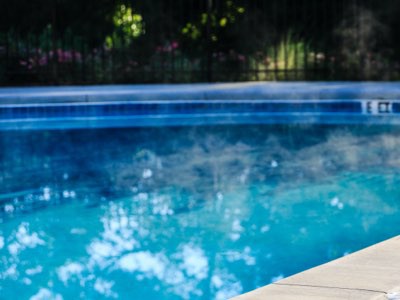- Home
- Education & Support
- Water Education Center
- Pool & Spa
- Know Your Pool Equipment: Pool Heaters
Choose The Right Pool Heater For Your Pool
Adding a pool heater allows you to extend your swimming season and control your pool water temperature for the perfect swimming experience. Below, you will find information regarding pool heating basics, the various types of pool heating technology and the questions you need to answer before determining the best pool heating option for your pool.
TO GET STARTED
Before you choose your pool heating equipment, be sure to schedule an appointment with your pool professional so they can provide expert insight into what pool heating option best suits your swimming environment.
Find A Dealer
If you do not have a pool professional, consider using our Find a Dealer tool so you can find a pool pro in your area.
FAQs
-
How do pool heaters work?
-
Swimming pool heaters work by transferring heat to your pool water through a heat exchanger. Heat exchangers allow your pool water to warm up by exposing the water to a source of heat as it pumps through the pool heater.
-
Will adding a pool heater break my bank?
-
Adding a pool heater can be a significant investment. One of the most significant factors associated with operating your pool heater is efficiency.
The more energy-efficient the pool heater, the lower the operational cost, and the less time it needs to run to deliver the same amount of heat for your pool water.
For example, if you buy $1.00 worth of gas and your heater is 82% efficient, your heater puts $0.82 worth of heat into the water. Likewise, at 96% efficiency, the ETi® 400 and High-Efficiency Pool and Spa Heater would put $0.96 worth of heat into the water for the same price. The more efficient the heater, the less it costs to operate.
-
What factors should I consider before choosing a pool heating solution?
-
- SIZE OF HEATER
Pool heaters and heat pumps are sized based on their heating capacity measured in British Thermal Units (BTUs). A BTU measures how much energy is required to heat 1 gallon of water by 1 degree Fahrenheit (1F). Most heat pumps can deliver between 100,000 – 150,000 BTUs depending on their size, and most gas pool heaters produce between 175,000 – 400,000 BTUs. - LOCATION, GAS AVAILABILITY AND ELECTRICITY COSTS
In general, heat pumps thrive in mild to warm climates where electricity costs are low to moderate. Gas heaters can be a great option in cooler climates where gas prices are low to moderate. - SIZE AND FEATURES OF YOUR POOL
Work with your pool professional to identify the right pool heating option for your pool since the size and additional pool features may dictate which pool heating option delivers optimal pool heating performance.
- SIZE OF HEATER
-
How do I maximize my pool heating?
-
- CHECK POOL CHEMISTRY WEEKLY
When you routinely check and maintain proper pool water chemistry, you minimize the chance of heater damage or corrosion. - REMEMBER TO WINTERIZE YOUR POOL EQUIPMENT
It’s nice to control your pool water temperature, but in the chance of a snowstorm or if you experience all four seasons, remember to get on your pool pro’s schedule to help winterize your pool equipment. - PRO TIP: TOTAL CONTROL AT YOUR FINGERTIPS = COST MANAGEMENT
Managing the run-time of your pool heater or heat pump efficiency is one of the best ways to lower utility costs and keep more money in your pocket. Pool automation systems can help reduce operating costs by enabling you to set schedules and run times for your pool heating technology and equipment, so your pool is warm when you want it to be and saving you energy when you don’t.
- CHECK POOL CHEMISTRY WEEKLY
TYPES OF POOL HEATING
The heat source used to warm your water can vary since several pool heating options exist, such as gas heaters, heat pumps, and hybrid heating technology. Below you will find the three pillars of pool heating equipment to help you navigate which pool heating option best suits your lifestyle.
OPTION 1: GAS POOL HEATERS
Gas pool heaters use natural gas or propane to generate heat, which is an ideal choice if you live in an area with access to low-cost natural gas or propane fuel, high electricity costs, or you want your pool heated as fast as possible.

THE STRENGTHS:
- Lower initial purchase price
- Optimal performance in all climates
- Fast heat-up times
- Quiet operation
- Remote control via pool automation
THE TRADE-OFFS:
- Higher cost to operate
- Consumes large amounts of gas
- Lower energy efficiency compared to heat pumps
OPTION 2: POOL HEAT PUMP
Pool heat pumps use electricity to efficiently move heat from the air to your pool water but take longer to heat than a gas heater. This type of pool heating is a superior option if you live in an area with low electricity costs, moderate climate, or do not have access to natural gas or propane.

THE STRENGTHS:
- Highly energy efficient; lower operational cost
- Longer service life and dependable operation
- Remote control via pool automation
THE TRADE-OFFS:
- Heating performance is related to air temperature and humidity
- Higher initial purchase price
- The sound level may be higher than a gas heater
OPTION 3: HYBRID HEATING TECHNOLOGY
Hybrid heating technology combines the fast-heating ability of a gas heater and the energy efficiency of a heat pump.
Did you know? Pentair has the first and only hybrid heating solution for pools.

THE STRENGTHS:
- Heats-up faster than a heat pump
- More efficient than a gas heater
- Can operate at low air temps
- Produces more heat with less energy to minimize carbon footprint
- Longer service life and dependable operation
- Remote control via automation
THE TRADE-OFFS:
- Higher initial purchase price
- Larger footprint than a gas heater
- Installation requires both gas and electrical connection
CHOOSING THE RIGHT HEATING SOLUTION FOR YOU
Several factors go into selecting the right heating technology for your pool and lifestyle. Pool heating can be quite technical, and we recommend partnering with a professional to assist with selecting the ideal heater for your pool.
Be sure to connect with your pool professional to help you choose the right heating solution for you. Reach out to your nearest pool professional and ask about the different heating technologies offered by Pentair.
Find A Dealer
Be sure to connect with your pool professional to help you choose the right heating solution for you. Reach out to your nearest pool professional and ask about the different heating technologies offered by Pentair.
Contact Us
Contact Pentair Consumer Support to assist in choosing the right pool heating solution for your pool and connecting you to a Pentair approved pool professional.

